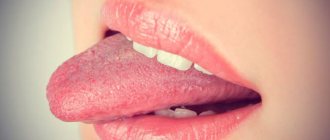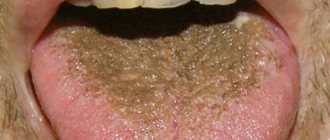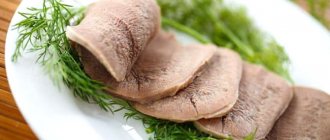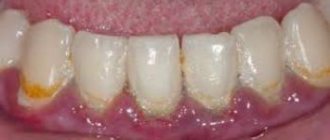How to remove dark plaque on the tongue?
Language is a unique indicator of human health.
By its appearance, since ancient times, doctors could make a diagnosis and it was believed that the patient had recovered if the surface of this organ returned to a light pink hue. There are various external factors that influence the type of plaque. Sometimes it can even change with the change of season. During a meal, pieces of food are retained between the taste buds and bacteria begin to multiply intensively in these areas, staining the surface of the tongue with the products of their vital activity. Sometimes a dark coating can appear in smokers, coffee drinkers, and red wine drinkers. It can be easily removed using a special scraper or by rinsing the mouth and it will not be a symptom of any disease.
If, when brushing your teeth in the mirror, you suddenly discover that instead of a pinkish surface, a dark coating is visible on the tongue, then in most cases this indicates serious disorders in the body. The more difficult it is to remove and the denser it is in consistency, the more severe and advanced the primary disease.
Dark plaque may appear due to illness or consumption of coloring products.
While for an ordinary person the details may not be important, the doctor very carefully studies the smallest details in the appearance of the tongue. There are many different shades of dark plaque:
- black can be a symptom of kidney pathology, nephritis;
- light brown indicates diseases of the skeletal and respiratory systems;
- yellow-brown is often observed with alcoholism, diseases of the gastrointestinal tract, and excessive use of drugs;
- dark brown occurs with dehydration, acute abdomen and serious disorders of the gastrointestinal tract;
- gray and dark gray can indicate chronic stomach diseases and constipation, candidiasis;
- purple indicates stagnation in the circulatory system;
- gray-green or brown-green occurs with cholecystitis and nephritis, oral candidiasis;
- gray-blue is found in Crohn's disease and cholera.
It is also important to evaluate its consistency. It can be dry or moist, fatty and cheesy. All these nuances indicate exactly how the disease progresses. It is necessary to see whether it is easily removed and whether there is any pain during this procedure.
The location of plaque on the surface of the tongue is studied separately:
- plaque on the tip of the tongue indicates diseases of the cardiovascular system;
- along the edges - about lung diseases;
- at the base of the tongue - about pathologies of the gastrointestinal tract;
- on the sides at the base - about liver and spleen disease.
Patients are advised to perform oral hygiene procedures daily. It is necessary to brush your teeth and the surface of your tongue at least twice a day. It is best to use a special plastic scraper for this, which will not injure the delicate surface of the tongue. You can use special gels, which are applied to the darkened mucous membrane for a few minutes, and then rinse thoroughly and spit out the used product.
It is impossible to get rid of dark plaque on the tongue without treating the underlying disease. Based on the established diagnosis, the doctor prescribes treatment for each patient individually.
- For stomatitis, it is necessary to rinse every two hours with local antiseptics (Hepilor, Chlorophyllipt, Tantum Verde).
- Antifungal agents are prescribed for candidiasis (Clotrimazole, Fluconazole, Pimafucin).
- Probiotics containing live bifidobacteria and lactobacilli are necessary to restore intestinal microflora (Linox, Acipol, Bifidumbacterin).
- Prebiotics stimulate the body to produce its own bacteria by containing a nutrient medium for them (Duphalac, Normaze, Lactusan).
- Drugs to strengthen the immune system are necessary to increase the body's resistance to harmful substances (Cycloferon, Ribomunil, Kagocel).
- Local disinfectants are necessary for sanitation of the oral cavity. You can use Chlorhexidine, Rezocin solution, Salicylic alcohol.
- Drugs that stimulate the secretion of gastric juice are necessary for gastritis with low acidity (Limontar, Prozerin, Etimizol).
- Antibacterial agents are needed for the treatment of aggressive types of gastritis (Cephalexin, Enterofuril, Furazolidone).
- Sorbents are used to eliminate toxic substances from the body (activated carbon, Enterosgel).
- Antacids are necessary for gastritis with high acidity and heartburn (Rennie, Phosphalugel, Maalox).
- Preparations to enhance the protection of the gastric mucosa (De-Nol, Biogastron, Venter).
- Vitamins B and PP must be used if they are deficient in the body.
Sometimes, to get rid of dark plaque on the tongue, it is enough to follow a special diet for a long time, aimed at normalizing the acid-base balance and metabolism. To alkalize the body, you should consume more of the following foods:
- greenery;
- citruses;
- avocado;
- cabbage;
- tomatoes;
- potato;
- radish;
- turnip;
- garlic;
- dried fruits.
For the body to function properly, it is necessary to consume more “alkaline” foods.
If there is a lack of nicotinic acid, patients are advised to increase their consumption of meat, liver, egg yolks, milk, legumes, buckwheat, and peanuts. An adult needs to consume about 15 mg of vitamin PP per day.
Also, for the health of the body, it is worth reducing the consumption of the following foods:
- sweets;
- carbonated drinks;
- fast food;
- smoked meats;
- fatty, salty, canned foods;
- alcohol;
- coffee.
Why does red wine stain your lips and tongue?
I always thought that only bad, low-quality wine stains lips and tongue, and contains artificial dyes. And the more often I was able to taste expensive wine, the more surprised I was... In a number of cases, the effect was the same. So I decided to look for information about whether it’s true that only bad wine leaves evidence of a feast on the skin.
We invite you to familiarize yourself with Green coating on the tongue of an adult and a child
I decided to share the translated article - the author talked not only about why this happens, but also how to deal with it.
Let's ask the bartender: why does red wine stain your lips and tongue?
Oh, first of all, you should take a look at me after I've been tasting wine for the day. The lips are exclusively purple. The skin around my thumb and index finger, with which I hold the glass, is also stained. Doubly creditable. I try to rarely drink red wine during parties or anywhere there isn't a plate of food in front of me, all for this reason.
Many red wines, especially heavy ones, contain tannins and other components responsible for the rich color of the wine, which subsequently “stick” to our lips and tongue. This problem only gets worse with dryness.
Unfortunately, some of us are more susceptible to the effects of red wine.
To avoid looking like a witch at work on Monday, use these simple tips:
- Brush your teeth before drinking wine. It is known that if you do not brush your teeth after breakfast, a lot of excess will cling to them and your teeth will stain faster.
- Do not rub your lips after coloring, you will only harm them (or better yet, wipe your lips with lemon).
- Drink plenty of water and hydrate.
- Eat while drinking red wine. After all, food in this case will be an absorbent barrier for coloring pigments.
- Raid the pharmacy to grab hydrogen peroxide.
- Forget about points 1-5 and switch to white wine. hee {amp}amp;#128578;
Experts in the restaurant industry answer questions about etiquette, food and drinks, and the activities of public catering establishments that interest Lucky Ducky readers.
29 September 2014 16:17
Lucky Ducky, with the support of experts, answers the most pressing questions.
Answered by Roman Sergeev, director of the Code de Vino enoteca
“The clear answer is: no, this does not depend in any way on the quality of the wine, but is connected with how it was produced, what type of grape was used, as well as with the physiological characteristics of the person.
In practice, you often come across the fact that expensive wines, with a good pedigree and from trusted sources, can also stain the tongue and lips.
It depends on the extract content, on whether there is a lot of sugar and tannins in the drink. The more vibrant, powerful and densely colored a wine is, the more color it produces. As a rule, Shiraz, Malbec, Cabernet can color more intensely due to the fact that the grape varieties themselves contain more of this extract and coloring substances.
In addition, the region and the process itself are important: Europeans usually prefer light extraction, and New World winemakers are trying to make wines brighter and at the fermentation stage they keep the wine longer on the skins of the grapes, which, in fact, enrich the product with dye.
It’s interesting that in a company of several people drinking the same wine, the degree of coloration by it can be different, which, of course, is determined by physiological characteristics.”
There is no connection between the price and the ability of wine to stain teeth, tongue and lips in shades of red or purple.
The reason for this is anthocyanins - flavonoids or polyphenols of plant origin. They are the ones who give the wine that very red color during the maceration process. This is natural and normal. And it does not mean low or high quality wine. These are the characteristics of some red grape varieties. First of all, we are talking about varieties with thick skin and small berries: pinotage, cabernet sauvignon, cabernet franc, shiraz, malbec.
I've noticed many times that on dates people tend to avoid ordering red wines. This is precisely because stained teeth make a smile less attractive. But this fact should not influence the choice of wine. Moreover, much has already been said about the beneficial properties of anthocyanins: strengthening capillaries, increasing the elasticity of red blood cells, antibacterial properties, and so on. There are a few life hacks that can help you choose wine without feeling embarrassed.
Causes and factors of appearance
Sometimes a dark coating on the tongue may appear due to the use of certain foods or medications. Also, this symptom may be a consequence of special conditions of the body or external influences.
- Taking some medications can cause a light brown coating on the tongue. It appears due to the abuse of drugs such as Malavit, Faringosept, and steroid drugs.
- The use of drugs containing bismuth, which are used for gastritis and heartburn (Vicalin, De-nol, Ulcavis).
- Lack of vitamin PP or nicotinic acid in the body.
- A lack of B vitamins, in addition to dark plaque, can also lead to the appearance of teeth marks on the tongue.
- In smokers, smoke, phenols and nicotinic acid can constantly stain not only the tongue, but also the teeth in brownish shades.
- Excessive consumption of fatty meat, sweets, chocolate, and sweet baked goods leads to an imbalance in the acid-base balance, the body gradually becomes acidic, and patients develop acidosis. Also, such a diet contributes to a lack of vitamins, which are abundant in fruits and vegetables.
- The body's contamination with various toxins can also cause the appearance of plaque on the tongue.
- Lead poisoning often appears as small black spots all over the tongue. In this case, the edges of the gums become grayish, and a metallic taste is felt in the oral cavity. This condition also has a synonym - Remak syndrome.
- Dehydration can also cause brown plaque to appear. This is especially common with long-term toxicosis in pregnant women.
- Alcohol abuse and chronic alcoholism have a detrimental effect on the condition of the entire body. The liver, kidneys, cardiovascular system and organs of the gastrointestinal tract are affected. There is also constant dehydration of the body and disruption of the microflora, which leads to the appearance of a dark coating on the tongue.
Lead poisoning may occur due to consumption of vegetables treated with pesticides containing heavy metals.
In most cases, a dark coating on the tongue of patients indicates various serious diseases. Sometimes these can be diseases of the oral cavity.
- Oral candidiasis develops due to fungi of the same name. At the first stage of the disease, the tongue is covered with a dense white coating, but later it gradually darkens and acquires a gray or light brown tint. Often, when cleansing, ulcers remain on the mucous membrane, which are very itchy and sometimes even bleed.
- Advanced stomatitis is a serious threat even to human life, since the infection can affect internal organs, such as the lungs. In addition to plaque on the tongue, patients also develop painful ulcers.
- Chromogenic fungus in the mouth contributes to the formation of plaque not only on the tongue, but throughout the entire oral cavity. The teeth, gums and cheeks are covered with dark green spots.
- Disturbance of the microflora of the oral cavity due to various diseases and the use of antibiotics. These drugs destroy not only pathogenic microorganisms, but also those necessary for normal life.
Chromogenic fungus leads to plaque not only on the tongue, but also on the gums and teeth
Most often, patients are diagnosed with all sorts of diseases of the gastrointestinal tract, which lead to a dark coating on the tongue.
- Severe or corrosive gastritis is an inflammation of the gastric mucosa due to the ingress of various acidic or alkaline solutions and radioactive substances.
- Fibrinous gastritis develops due to various purulent processes in the stomach. This disease is quite rare and usually appears during infectious infection with the measles virus, scarlet fever, or typhoid fever.
- Peptic ulcers are most often found in men between the ages of 20 and 50. Alcoholism may be a provoking factor. The disease is accompanied by a sour taste, severe stomach pain, nausea and vomiting.
- Stones and inflammatory processes in the ducts of the salivary glands can also lead to the appearance of dark plaque. At the same time, the surface of the tongue is very dry, it may even crack.
- Enterocolitis or inflammation of the small and large intestines can also cause a brown coating on the tongue.
- Crohn's disease is an autoimmune disease that causes chronic constipation and an increase in melanin in the body. Patients experience adrenal dysfunction and the appearance of blue-black spots throughout the body. The course of the disease is chronic; patients constantly experience inflammation of various parts of the digestive tract. Another name for Crohn's disease is granulomatous enteritis.
- Dysbacteriosis or a violation of the microflora composition greatly affects digestion and absorption of nutrients in the intestines. This can happen due to various factors: bad habits, taking antibiotics, stress and even poor ecology. Due to the increased proliferation of pathogenic microorganisms in the oral cavity, a dark coating may appear on the tongue.
- Diseases of the pancreas can also cause the appearance of a dark brown coating on the surface of the tongue. Very often, pain in the hypochondrium, bitter taste, dehydration, nausea and vomiting are also present.
- Liver pathology is accompanied by bitterness in the mouth and the appearance of a brownish-yellowish coating on the tongue. Patients are concerned about pain in the right hypochondrium, nausea, weight loss. Sometimes jaundice appears, in which the skin and mucous membranes acquire a yellow tint.
- Cholecystitis is an inflammatory process in the gallbladder. This can happen due to infection with intestinal microflora due to a violation of the outflow of bile. Patients develop fever, severe pain, nausea, and vomiting. Most often, this disease is registered in women due to various processes during pregnancy and hormonal levels. Due to stagnation of bile, a yellowish and brown coating may appear on the tongue.
- Chronic constipation without an inflammatory process can also cause the appearance of a gray coating on the tongue.
Disturbances in the composition of microflora negatively affect the condition of the whole organism
But it is not always diseases of the gastrointestinal tract that lead to the appearance of a dark coating on the tongue. Sometimes the cause may be various infectious diseases, as well as pathologies of other internal organs.
- Respiratory diseases can also cause brown plaque. Patients are found to have pneumonia, bronchitis, and tracheitis.
- Arthritis is an inflammatory disease of the joints. It develops due to the action of infections, injuries, as well as allergic, dystrophic and reactive processes in the body. Despite the fact that the main symptoms are associated specifically with pain in the skeletal system, some patients experience a dark coating on the tongue.
- Autoimmune blood diseases that are inherited. These include hemolytic anemia and erythropoietic uroporphyria. In these diseases, patients experience constant destruction of red blood cells, called hemolysis.
- ARVI manifests itself differently in patients. Some may experience a slight fever, while others may have more severe symptoms and may also develop a dark coating on the tongue.
- HIV infection leads to a decrease in the body's resistance to all kinds of pathogens due to disorders in the immune system. All this contributes to the growth of bacteria in the oral cavity, which can color the tongue in various colors, including gray, brown and black.
- Sore throat is an acute infectious disease that affects the palate and tonsils. Patients complain of very severe pain; it becomes almost impossible to swallow food. The proliferation of pathogenic microorganisms in the oral cavity contributes to the formation of various coatings on the tongue, including dark ones.
- Lymphostasis is a disease in which the functioning of the lymphatic system is disrupted. Patients exhibit swelling, severe thickening of the limbs, and a beige coating on the surface of the tongue.
- Nephritis is an inflammatory disease of the kidneys, which very often leads to disruption of the structure of these organs. In patients, the excretory function is weakened, severe pain appears in the lumbar region, the amount of urine decreases, appetite decreases, nausea and vomiting appear. This disease is very serious and if not treated promptly, a kidney transplant may be required.
- Diabetic coma occurs in patients with diabetes due to a lack of insulin in the body. In this condition, the tongue is dry, cracked, and covered with a brownish-brown coating.
- Addison's disease or hypocortisolism is a chronic insufficiency of the adrenal cortex, which loses the ability to produce the required amount of cortisol.
- Cholera is a very dangerous intestinal infectious disease that occurs due to infection with Vibrio cholerae. Patients suffer from constant bouts of vomiting, dehydration and very high fever.
We suggest you familiarize yourself with Inflammation of the lymph nodes in the neck: symptoms and treatment of cervical lymphadenitis, reasons why the lymph nodes in the neck hurt
— young wines stain teeth more strongly than aged ones, but it is worth remembering that the grape varieties Pinotage, Cabernet Sauvignon, Cabernet Franc, Shiraz and Malbec have a stronger staining effect;
- New World wines are more likely to stain your teeth;
— if you want to drink red wine without damaging your teeth, order wines that are less intense in color, such as pinot noir. He is also Spätburgunder and Blauburgunder;
- in the end, if you are so puzzled by this problem, buy Wine Wipes to remove wine plaque from your teeth.
In Russia, I came across American napkins from the Borracha company (USA). According to legend, sommeliers participated in their development, and their taste is not reflected in the taste of the wine. Using special wipes is better than simply wiping stained teeth with a regular wipe. In the latter case, you will cause more harm if you rub the “paint” into the enamel of your teeth.
And of course, don’t forget about visits to the dentist (teeth cleaning, strengthening tooth enamel, whitening).
Diagnosis and differential diagnosis
To find out exactly what disease led to the appearance of a dark coating on the tongue, you need to consult a doctor. First of all, it is better to visit a therapist who will conduct an examination and collect the patient’s medical history. The patient's abdomen is palpated, the function of the lungs and heart is listened to, and bad habits, diseases, and injuries are also found out. Based on these data, the therapist will give a referral to a specific specialist.
The patient may be prescribed the following examinations:
- general blood analysis;
- blood chemistry;
- urine and stool analysis;
- fluorography;
- Ultrasound of internal organs;
- gastroscopy, etc.
Most often, the patient has to visit a gastroenterologist who specializes in diseases of the gastrointestinal tract. A referral to an infectious disease specialist and endocrinologist may also be issued.
Gastroscopy allows you to examine the mucous membrane of the esophagus and stomach using a special endoscope
Why clean your tongue?
The human tongue is involved in chewing, salivation and the formation of taste perceptions. Everything we drink and eat every day comes into contact with this organ. Food remains accumulate in the teeth, but on the tuberous surface of the tongue, covered with a mucous membrane and numerous papillae, there are several times more of them. Some microbes die or are removed by salivation, but a film remains in hard-to-reach places in the cavity, for example at the root of the tongue. Over time, it thickens, spreads to other areas and gradually covers the entire surface.
Plaque on the tongue must be removed daily. The best way to deal with this is scrapers, spoons, brushes, special gels and rinses. Regular use of cleaning products eliminates unpleasant odors and stubborn deposits, and reduces the risk of developing dental diseases. In addition, the effect on the receptors is a good massage for the tongue. Such procedures sharpen the sense of taste and stimulate the functioning of internal organs.
Treatment prognosis and possible complications
The prognosis of treatment will depend on what initial disease was detected in the patient. In case of dental problems, a few visits to the dentist are enough to get rid of most of the problems that arise. Diseases of the gastrointestinal tract can lead to bleeding, which requires urgent hospitalization and surgical treatment. The success of treating infectious diseases strongly depends on the patient’s immunity and the timeliness of starting the use of prescribed medications.
Treatment
If a black coating is detected on the tongue, treatment must be based on an accurate diagnosis. Only in this case can you completely get rid of the disease, otherwise you can struggle with external manifestations for a long time and in vain, without affecting the very cause of darkening of the tongue.
Patients are usually interested in why a black coating appears on the tongue and what to do in this case. Only a doctor can answer the first question, since there are quite a few reasons for darkening of the tongue. The second answer should also be answered by a doctor, since the method of getting rid of black plaque directly depends on the diagnosis that will be established as a result of a thorough examination.
Be that as it may, at the first signs of the appearance of a dark coating on the tongue, all hygiene procedures should be carefully carried out, carefully cleaning the surface of the tongue with a toothbrush and paste.
Prevention
To avoid the appearance of a dark coating on the tongue, you must follow the advice of doctors.
- Play sports and give up bad habits. Physical activity has a beneficial effect on the functioning of all internal organs, strengthens the cardiovascular system and promotes weight loss.
- Avoid junk food, reduce your intake of fatty, sweet, salty and smoked foods. Give preference to lean meats, fresh vegetables and fruits.
- Maintain your oral health by brushing your teeth at least twice a day. Also clean the surface of your tongue and cheeks to avoid the proliferation of pathogens.
- Get preventive examinations from doctors and promptly treat any diseases that arise.
We invite you to familiarize yourself with Implantation after tooth extraction: when can an implant be placed?
A black coating on the tongue is often a rather alarming symptom, which indicates serious problems in the functioning of internal organs. It is necessary to consult a doctor in order to promptly cure any pathologies that have arisen. Under no circumstances should you self-medicate, as this can lead to serious deterioration in health. Watch your diet, lead a healthy lifestyle and give up bad habits.
What it is
A black coating on the tongue usually appears with severe damage to the digestive tract.
Moreover, the more complex the patient’s condition, the darker and denser the plaque. It most often forms on the surface of the tongue, but can also cover the teeth and the inner surface of the cheeks in a thick layer. The black and green coating can scare anyone. But before you panic, you should carefully analyze what you ate in the last 24 hours. After all, there is a whole list of foods, the consumption of which stains the tongue, lips and teeth black or dark. These products include, first of all, blueberries. Consuming activated charcoal can also temporarily turn your tongue black.
A black coating on the tongue of an adult can also appear in the presence of a disease such as acidosis. Acidosis disrupts the acid-base balance in the body. Those who eat little fresh vegetables and fruits, while leaning on flour and sweets, are susceptible to this disease. If the doctor confirms that the black plaque on the tongue and teeth is due to acidosis, it is necessary to cleanse the body of toxins.
Previously, it was believed that a black coating on the tongue indicates such a terrible disease as cholera.
Modern doctors do not support this statement, but are still inclined to believe that a black coating on the tongue appears most often with acidosis.









